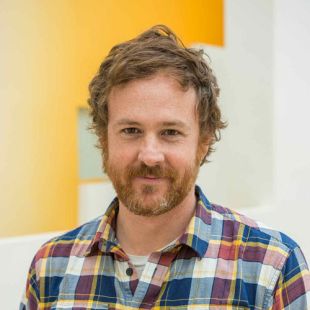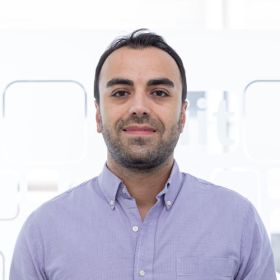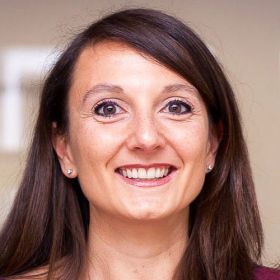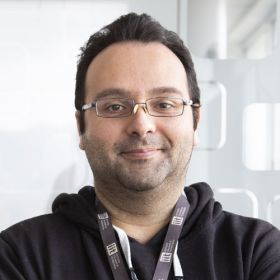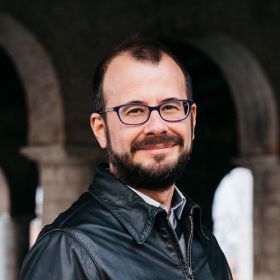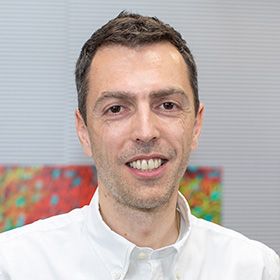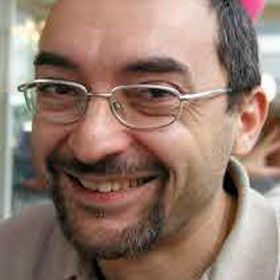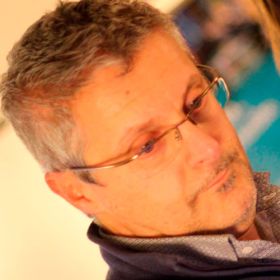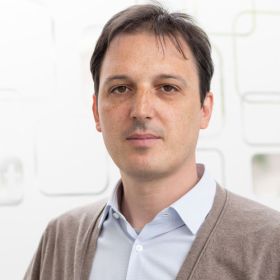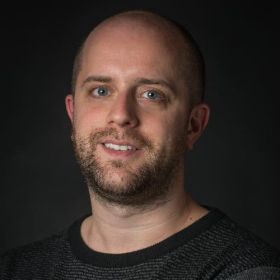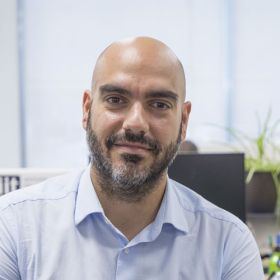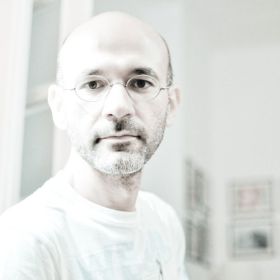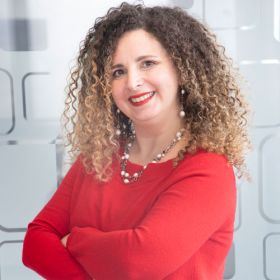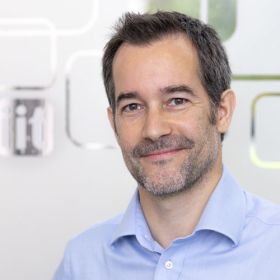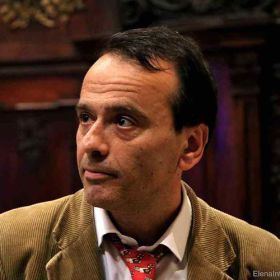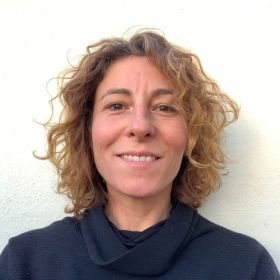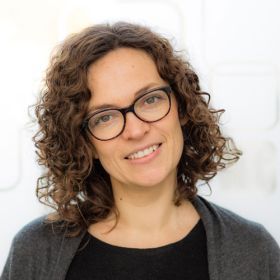Core Faculty
Arash Ajoudani
Arash Ajoudani is a tenured senior scientist at the Italian Institute of Technology (IIT), where he leads the Human-Robot Interfaces and physical Interaction (HRI²) laboratory. He also coordinates the AI for Manufacturing (AI4M) lab of the Leonardo labs, and is a principal investigator of the IIT-Intellimech JOiiNT lab. He received his PhD degree in Robotics and Automation from University of Pisa and IIT in 2014.
He is a recipient of the European Research Council (ERC) starting grant 2019 (Ergo-Lean), the coordinator of the Horizon-2020 project SOPHIA, and the co-coordinator of the Horizon-2020 project CONCERT. He is a recipient of the IEEE Robotics and Automation Society (RAS) Early Career Award 2021, and winner of the Amazon Research Awards 2019, of the Solution Award 2019 (MECSPE2019), of the KUKA Innovation Award 2018, of the WeRob best poster award 2018, and of the best student paper award at ROBIO 2013. His PhD thesis was a finalist for the Georges Giralt PhD award 2015 - best European PhD thesis in robotics. He was also a finalist for the Solution Award 2020 (MECSPE2020), the best conference paper award at Humanoids 2018, for the best interactive paper award at Humanoids 2016, for the best oral presentation award at Automatica (SIDRA) 2014, and for the best manipulation paper award at ICRA 2012.
He is the author of the book "Transferring Human Impedance Regulation Skills to Robots" in the Springer Tracts in Advanced Robotics (STAR), and several publications in journals, international conferences, and book chapters. He is currently serving as the executive manager of the IEEE-RAS Young Reviewers' Program (YRP), and as chair and representative of the IEEE-RAS Young Professionals Committee. He has been serving as a member of scientific advisory committee and as an associate editor for several international journals and conferences such as IEEE RAL, ICRA, IROS, ICORR, etc. He is a scholar of the European Lab for Learning and Intelligent Systems (ELLIS). His main research interests are in physical human-robot interaction, mobile manipulation, robust and adaptive control, assistive robotics, and tele-robotics.
Chiara Bartolozzi
Chiara Bartolozzi is a Researcher at the Italian Institute of Technology. She earned a degree in Engineering at the University of Genova (Italy) and a PhD in Neuroinformatics at ETH Zurich, developing analogue subthreshold circuits for emulating biophysical neuronal properties onto silicon and modelling selective attention on hierarchical multi-chip systems.
She is currently leading the Event-Driven Perception for Robotics group, with the aim of applying the "neuromorphic" engineering approach to the design of robotic platforms as enabling technology towards the design of autonomous machines.
This goal is pursued by inducing a paradigm shift in robotics, based on the emerging concept of Event-Driven (ED) sensing and processing. Similarly to their biological counterpart, and differently from traditional robotic sensors, ED sensory systems sample their input signal at fixed (and relative) amplitude changes, intrinsically adapting to the dynamics of the sensory signal: temporal resolution is extremely high for fast transitory signals and decreases for slower inputs.
This approach naturally leads to better robots that acquire, transmit and process information only when needed, optimising the use of resources, leading to real-time, low-cost, operation.
Chiara has participated in a number of EU funded projects, she is currently coordinating the European Training Network "NeuTouch", where 15 PhD students are studying how touch perception works in humans and animals, in order to develop artificial touch perception systems for robots and hand prostheses. As the leader of the educational activities of the coordination and support action NEUROTECH, she is co-organising the Neuromorphic Colloquium, a series of online events to build up educational material for the next generation of neuromorphic researchers.
She is an IEEE member, actively supporting the CAS and RAS societies. In 2020, she has co-chaired "AICAS2020", on Circuits and systems for efficient embedded AI.
Paolo Frasconi
Paolo Frasconi is Professor of Computer Engineering at the University of Florence. He previously held academic positions at KU Leuven, University of Cagliari, University of Wollongong, and Massachusetts Institute of Technology. His research interests are in the area of machine learning (e.g., neural networks, graphical models, kernel machines, and relational learning) bioinformatics (e.g., protein structure and function, small molecules), neuroinformatics and medicine. He has also contributed applications to natural language processing, text, music, and pattern recognition. These activities are collected in over 150 refereed papers collecting over 19000 citations and an h-index of 47 (Google Scholar, 2021). He is an Action Editor for Machine Learning journal since 2010 and has been Associate Editor for Artificial Intelligence Journal, IEEE Transactions on Knowledge and Data Engineering, IEEE Transactions on Neural Networks. Among other services, he has been Associate Program Chair for IJCAI 2022, Program Chair for ECML PKDD 2016, Program Chair for ILP 2010, Vice-Chair for ICDM 2003.
Vittorio Murino
Vittorio Murino is a full professor at the University of Verona, Italy, and visiting scientist of PAVIS (Pattern Analysis and Computer Vision) department at the Istituto Italiano di Tecnologia, in Genova, Italy. From 2009 to 2019, he worked at the Istituto Italiano di Tecnologia in Genova, Italy, as director of the PAVIS (Pattern Analysis and Computer Vision) department. From 2019 to 2021, he joined the Ireland Research Centre of Huawei Technologies (Ireland) Co., Ltd. in Dublin, as Senior Video Intelligence Expert.
His main research interests include computer vision, pattern recognition and machine learning, nowadays focusing on deep learning approaches, domain adaptation and generalization, and multimodal learning for (human) behaviour analysis and related applications, such as video surveillance and biomedical imaging. Prof. Murino is co-author of more than 400 papers published in refereed journals and international conferences. Finally, prof. Murino is IEEE Fellow, IAPR Fellow, and ELLIS Fellow.
Alessandra Sciutti
Alessandra Sciutti is Tenure Track Researcher, head of the CONTACT (COgNiTive Architecture for Collaborative Technologies) unit of the Italian Institute of Technology (IIT). With a background in Bioengineering, she received her PhD in Humanoid Technologies from the University of Genova in 2010. After two research periods in USA and Japan, in 2018 she has been awarded the ERC Starting Grant wHiSPER (www.whisperproject.eu), focused on the investigation of joint perception between humans and robots. She published more than 70 papers in international journals and conferences and participated in the coordination of the CODEFROR European IRSES project. She is currently Associate Editor for several journals, among which the International Journal of Social Robotics, the IEEE Transactions on Cognitive and Developmental Systems and Cognitive System Research. The scientific aim of her research is to investigate the sensory and motor mechanisms underlying mutual understanding in human-human and human-robot interaction.
Massimiliano Pontil
Lorenzo Rosasco
ELLIS Research Programme Director
Lorenzo Rosasco is full professor at the DIBRIS Department at the University of Genoa, a visiting professor at the Massachusetts Institute of Technology, and external collaborator at the Istituto Italiano di Tecnologia. He received his PhD from the University of Genoa in 2006 and has been visiting student at the Toyota Technological Institute at Chicago and at the Center for Biological and Computational Learning at MIT. He held a research scientist position at MIT between 2006 and 2009. He is the principal investigator of the Laboratory for Computational and Statistical Learning and a coordinator of the Machine Learning center of the University of Genova (MaLGa). In 2019 he obtained the ERC consolidator grant “Efficient algorithms for sustainable machine learning”. His research focuses on studying theory and algorithms for machine learning. He is known for his foundational work in machine learning as well as the development of sound large scale machine learning algorithms. He authored more than 100 peer-reviewed papers in international journals.
Alessio Del Bue
Lorenzo Natale
Luca Oneto
Luca Romeo
Daniele Pucci
Daniele received the bachelor and master degrees in Control Engineering with highest honors from ”Sapienza”, University of Rome, in 2007 and 2009, respectively. In 2013, he earned the PhD title with a thesis prepared at INRIA Sophia Antipolis, France, with the supervision of Tarek Hamel, Salvatore Monaco, and Claude Samson. From 2013 to 2017, he has been a postdoc at the Istituto Italiano di Tecnologia (IIT) working within the EU project CoDyCo focusing on the balancing problem of the iCub humanoid robot. From August 2017 to August 2021, he has been the head of the Dynamic Interaction Control lab, a group of about 20 members focusing on the iCub locomotion walking problem. In this period, Daniele also laid the basis for the "Aerial Humanoid Robotics", a new branch of Robotics whose main aim is to achieve flying humanoid robots. Daniele has also been the scientific PI of the H2020 European Project AnDy, and now is: task leader of the H2020 European Project SoftManBot, coordinator of the joint laboratory between IIT and Honda JP, principal investigator (PI) in the Camozzi-IIT and Danieli Automation-IIT joint labs. Lastly, Daniele is the coordinator of the ergoCub project, a 5 million, three year joint project between INAIL and IIT. Since September 2021, Daniele is the PI leading the Artificial and Mechanical Intelligence research line at IIT, a team composed of about forty members that combines AI and Mechanics to devise the next generation of the iCub humanoid robot.
Claudio Semini
Claudio Semini (MSc 2005, PhD 2010) is the head of the Dynamic Legged Systems (DLS) lab at Istituto Italiano di Tecnologia (IIT) that developed a number of high-performance hydraulic robots, including HyQ, HyQ2Max, and HyQReal. He holds an MSc degree from ETH Zurich in electrical engineering and information technology. He spent 2 years in Tokyo for his research: MSc thesis at the Hirose Lab at Tokyo Tech and staff engineer at the Toshiba R&D centre in Kawasaki working on mobile service robotics. During his PhD and subsequent PostDoc at IIT, he developed the quadruped robot HyQ and worked on its control. Since 2012 he leads the DLS lab. Claudio Semini is the author and co-author of more than 100 peer-reviewed publications in international journals and conferences and he received several awards for them. He is also a co-founder of the Technical Committee on Mechanisms and Design of the IEEE-RAS Society. He is/was the coordinator/partner of several EU-, National and Industrial projects (including HyQ-REAL, INAIL Teleop, Moog@IIT joint lab, ESA-ANT, etc). His research interests include the construction and control of highly dynamic and versatile legged robots for field application in real-world operations, locomotion, hydraulic drives, and others.
Sergio Decherchi
Sergio Decherchi obtained the Laurea degree summa cum laude in Electronic Engineering in 2007 from Genoa University, Italy, Europe. In 2011 he obtained a PhD in Electronic Engineering and Computer Science on Machine Learning and Data Mining from the same University while working at the Department of Biophysics and Electronic Engineering. From 2011 to 2016, he was Post Doctoral researcher at the Istituto Italiano di Tecnologia (IIT), Genoa, Italy, Europe, Department of Drug Discovery and Development (D3) where he designed, developed and applied computational intelligence/chemistry methods to drug discovery. In 2014 Sergio co-founded BiKi Technologies s.r.l. a company dealing with Molecular Dynamics and machine learning methods for drug discovery. From 2017 to 2022 Sergio is a technologist in IIT. In 2022 he obtained the national habilitation as Associate Professor in computer science, and from 2023 he is the coordinator of the Data Science and Computation IIT facility. He is the author of more than 70 papers in peer-reviewed Journals and conferences in the fields of computational intelligence and computational chemistry. Sergio has received some awards, EU/national/private grants, delivered several invited talks/lectures and co-organized some workshops (e.g. ECAM/CECAM). He is a reviewer for EU and national funding agencies. He serves as Associate Editor for the Springer Journal, Cognitive Computation.
Saverio Salzo
Saverio Salzo is a tenured assistant professor at the Department of Computer, Control and Management Engineering of Sapienza University Rome and an external collaborator of the Italian Institute of Technology (IIT) in Genoa, Italy, within the research line of Computational Statistics and Machine Learning. Since 2020 he is also honorary lecturer at University College London (UCL). Previously, he was member of the Laboratory for Computational and Statistical Learning in IIT. He received his degree in pure Mathematics (with honours) from the University of Bari in 2001 and a PhD in Computer Science from the University of Genova in 2012. His research interests are broadly directed to devise and analyze efficient algorithms for optimization in large scale scenarios and novel statistical methods for data inference and analysis. In particular, he worked on nonsmooth optimization methods, stochastic algorithms, hyperparameter optimization via bilevel optimization, optimization methods for optimal transport, and support vector machines and kernel methods in Banach spaces. He co-authored 28 peer-reviewed papers in international conferences and journals.
Alessandro Verri
Silvia Villa
Ernesto De Vito
Agnieszka Wykowska
Agnieszka Wykowska is PI of the Social Cognition in Human-Robot Interaction (S4HRI) research line at the Italian Institute of Technology, Genova. She is also affiliated with the Luleå University of Technology, Sweden as adjunct professor in Engineering Psychology and with University of Manchester as Visiting Professor. She obtained PhD in Psychology from the Ludwig-Maximilians-University in Munich (LMU) in 2008. Her background is cognitive neuroscience (M.Sc. in neuro-cognitive psychology, LMU, 2006) and philosophy (M.A. in philosophy, Jagiellonian University Krakow, Poland, 2001). In 2016 she has been awarded an ERC Starting Grant “Intentional Stance for Social Attunement”: InStance Her research focuses on social cognitive neuroscience and human-robot interaction. She uses behavioral measures (eyetracking, psychophysics) and EEG in HRI research. She is Editor-in-Chief of International Journal of Social Robotics and an Associate Editor of Frontiers in Psychology (section Cognition). She is Core Member of the Ellis Society (European Laboratory for Learning and Intelligent Systems) and a Board Member of the Association of ERC Grantees (AERG). She has served as guest (co-)editor of a special issue of the Philosophical Transactions of the Royal Society B titled “From social brains to social robots: Applying neurocognitive insights to human-robot interaction (2018/2019), and she repeatedly serves as Program Committee member for various conferences, such as “International Conference on Social Robotics”, or “Human-Robot Interaction”.
Tommaso Fellin
Tommaso Fellin graduated in Physics at the University of Padova and is currently senior principal investigator at the Italian Institute of Technologies (IIT) in Genova, Italy. Dr. Fellin is head of the Optical Approaches to Brain Function Laboratory, co-head (together with Dr. S. Panzeri) of the Neural Coding Laboratory, and currently serves as Associate Director for the Technologies for Life Sciences Research Domain at the IIT. Dr. Fellin is also recipient of the European Research Council (ERC) consolidator grant NEURO-PATTERNS and co-founder of the start-up SmartMicroOptics. His research activity focuses on the study of the brain microcircuits involved in the processing of sensory information and on the development of innovative optical methods to probe their function. His laboratory has recently applied machine learning approaches to perform fast image analysis to extract neuronal signals from large cellular populations.

